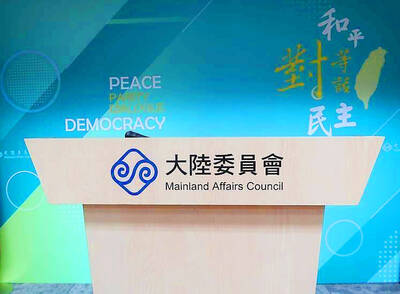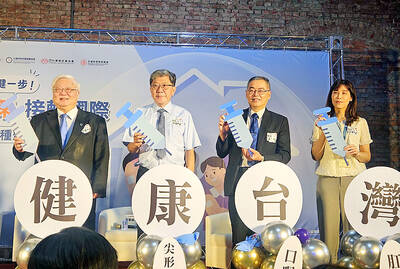Hong Kong should consider tightening lending rules to stop rapid credit growth and asset-price gains from damaging the economy, the IMF said.
“Strong capital inflows and the resultant large liquidity overhang in the financial system could potentially lead to rapid credit growth, fueling asset markets and creating macroeconomic volatility,” the IMF said in a report yesterday. “Countervailing prudential measures could play a role in mitigating the credit-asset price cycle.”
Money spilling into Hong Kong from unprecedented lending under China’s stimulus program and abundant US dollar liquidity has resulted in a 30 percent surge in property prices and a 56 percent jump in the benchmark stock index this year. The IMF said Hong Kong needs to supplement the “circuit breaker” measures already introduced to tame asset prices.
Hong Kong’s Transport and Housing Bureau on Nov. 20 said it planned to tighten rules on marketing of uncompleted apartments, responding to concerns that misleading sales tactics by property developers have contributed to a surge in prices this year.
The proposal follows measures announced by the Hong Kong government on Oct. 23 to raise the required down payment on luxury homes to 40 percent from 30 percent to curb property speculation.
In terms of additional regulatory action, IMF staff said the most effective tool that could be adopted by Hong Kong was a tightening of underwriting standards, including eligibility criteria for mortgage insurance.
The US Federal Reserve’s policy of keeping interest rates near zero is fueling the wave of speculative capital that may cause the next global crisis, Hong Kong Chief Executive Donald Tsang (曾蔭權) said on Nov. 13.
“We have a US dollar carry trade at the moment,” Tsang said. “Where is the money going — it’s where the problem is going to be: Asia. You can see asset prices going up, not only in [South] Korea, in Taiwan, in Singapore and in Hong Kong, going up to levels that are incompatible or inconsistent with the economic fundamentals.”
The IMF said that “as yet” the price increases in Hong Kong’s equity and mass property market “do not appear out of line with regional comparators.”
“Given the high level of liquidity in the system, credit growth has the potential to pick up quickly,” the Washington-based lender said. “Higher credit could drive higher asset valuations which, in turn, could be used as collateral to support greater borrowing.”
Hong Kong’s economic recovery “remains fragile” and exposed to the risk of a weakening of external demand, even as policy makers grapple with asset price inflation, the IMF said.
“The global economic outlook remains subject to considerable uncertainties,” Hong Kong Financial Secretary John Tsang (曾俊華) said yesterday in response to the IMF report.
“We are mindful of the prevailing risks in the external environment and will continue to adopt necessary measures to sustain economic growth,” he said.
The IMF said it expects the Hong Kong economy to “steadily strengthen” and expand 5 percent next year, with unemployment likely to decline in the coming months.
Hong Kong’s economy grew for a second straight quarter in the three months through Sept. 30, expanding 0.4 percent from the previous quarter as consumption and investment gained. The seasonally adjusted jobless rate for the three months to Oct. 31 slid to 5.2 percent.

A Chinese aircraft carrier group entered Japan’s economic waters over the weekend, before exiting to conduct drills involving fighter jets, the Japanese Ministry of Defense said yesterday. The Liaoning aircraft carrier, two missile destroyers and one fast combat supply ship sailed about 300km southwest of Japan’s easternmost island of Minamitori on Saturday, a ministry statement said. It was the first time a Chinese aircraft carrier had entered that part of Japan’s exclusive economic zone (EEZ), a ministry spokesman said. “We think the Chinese military is trying to improve its operational capability and ability to conduct operations in distant areas,” the spokesman said. China’s growing

BUILDUP: US General Dan Caine said Chinese military maneuvers are not routine exercises, but instead are ‘rehearsals for a forced unification’ with Taiwan China poses an increasingly aggressive threat to the US and deterring Beijing is the Pentagon’s top regional priority amid its rapid military buildup and invasion drills near Taiwan, US Secretary of Defense Pete Hegseth said on Tuesday. “Our pacing threat is communist China,” Hegseth told the US House of Representatives Appropriations Subcommittee on Defense during an oversight hearing with US General Dan Caine, chairman of the Joint Chiefs of Staff. “Beijing is preparing for war in the Indo-Pacific as part of its broader strategy to dominate that region and then the world,” Hegseth said, adding that if it succeeds, it could derail

COMPLIANCE: The SEF has helped more than 3,900 Chinese verify documents, indicating that most of those affected are willing to cooperate, the MAC said More than 3,100 spouses from China have submitted proof of renunciation of their Chinese household registration, the Mainland Affairs Council (MAC) said yesterday. The National Immigration Agency has since April issued notices to spouses to submit proof that they had renounced their Chinese household registration on or before June 30 or their Taiwanese household registration would be revoked. People having difficulties obtaining such a document can request an extension of the deadline or submit a written affidavit in lieu of it. The council said it would hold a briefing at 2:30pm on Friday at the immigration agency’s Taichung office in cooperation with the

The government-funded human papillomavirus (HPV) vaccination is to be expanded to boys at junior-high school starting in September, the Health Promotion Administration (HPA) said yesterday. The Taiwan Society of Otorhinolaryngology, Head and Neck Surgery, the Taiwan Association of Obstetrics and Gynecology, the Taiwan Immunization Vision and Strategy, the Infectious Diseases Society of Taiwan, the Taiwan Head and Neck Society, the Formosa Cancer Foundation and the National Alliance of Presidents of Parents Associations held a joint news conference in Taipei yesterday to raise public awareness about the risks of HPV infection, regardless of gender. Invited to give an address, HPA Director-General Wu Chao-chun